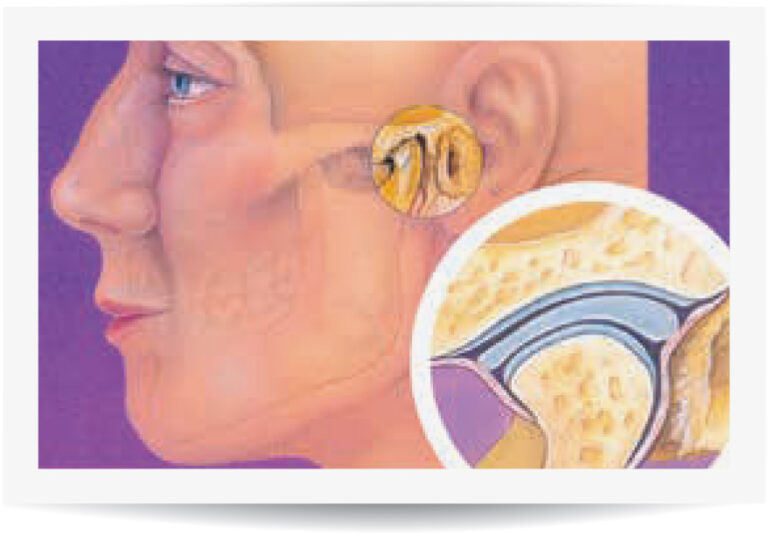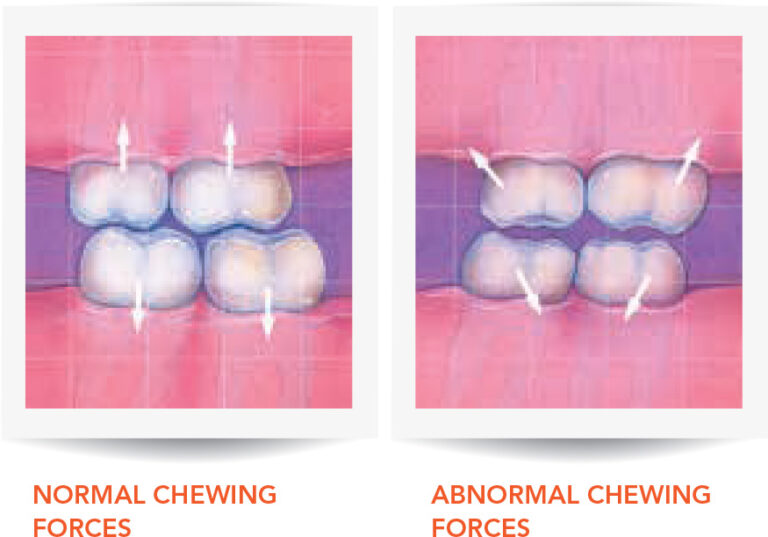What Is TMJ Syndrome?
Sixty million Americans have it. It’s more common in the elderly, and affects men and women equally. Its exact cause is unknown, but women are nine times more likely than men to seek treatment for this malady.
The lower jaw (mandible) is attached to the skull by a joint on each side of the face, called the TMJ, or temporomandibular joint. Any number of problems associated with the chewing muscles, ligaments, bones or the joints can prevent the TMJ from functioning properly. Hence, the term TMJ Syndrome.
Your Patient Guide
TMJ Syndrome
How Is TMJ Syndrome Treated?
- The first step is to eliminate the muscle spasms and pain that you are feeling. We recommend moist heat packs applied to the face, muscle massage and switching to a soft, non-chewy diet. Sometimes mild muscle relaxant drugs and/or pain medication are prescribed to the patient.
- Correcting the way that the teeth fit together is another technique for treating TMJ Syndrome. For example, if your bite is uneven, we can adjust it by selectively smoothing down the teeth that are too high. (This usually involves just one appointment and is painless.) A corrective bite plate or splint will also help.
- Counseling and Relaxation Therapy may also help some patients with TMJ Syndrome. These techniques help the patient to become aware of stressful situations; they help patients to control tension throughout various parts of their body. Biofeedback involves the use of an electric monitoring device to help reduce muscle tension in the jaws.
- Surgery is the final method of treating TMJ Syndrome. It may be used where muscle spasms have occurred for long periods, or where the joint itself may have become injured or arthritic. Sometimes the bones and soft tissues of the TMJ may slip out of normal position as a result of an accident or injury, requiring surgical correction.
What Are The Symptoms Of TMJ Syndrome?
There are many signs and symptoms of TMJ Syndrome, not all necessarily present in all cases. Some of the most common include:
HEADACHES
Particularly present upon awakening
TENDERNESS
Of the jaw muscles
PAIN
In or around the ear, that often spreads to the face
CLICKING, POPPING OR GRATING SOUNDS
When opening or closing the mouth
DIFFICULTY IN CHEWING
Or pain, when yawning or opening your mouth wide
“STUCK” OR “LOCKED” JAW
Stiff or immobilized feeling in the jaw area
EARACHE
Or pain when no infection is present
DIZZINESS
Feeling of being unbalanced, loss of equilibrium

The temporomandibular joint (tmj)
What Causes TMJ Syndrome?
Disorders often result when the chewing muscles and the TMJ work incorrectly. When this occurs, the muscles frequently cramp or go into spasms. These spasms can become part of a cycle that results in tissue damage, pain and muscle tenderness.
Accidents, including injuries to the jaw, neck or head, or even diseases such as arthritis may cause TMJ disorders. The two most common causes of TMJ Syndrome, however, are:
- Oral Habits
- Improper Bite

Oral Habits (Grinding & Clenching)
Sometimes patients clench their teeth together subconsciously, or they may actually grind (gnash) their teeth, usually at night. The term of this is bruxism. Clenching and grinding make the chewing muscles tired. This is what causes them to go into spasm – and spasm, causes pain.
Improper Bite
In some cases, the teeth do not come together properly when you bite. The general term for this is a malocclusion. An improper bite may cause stress on your chewing muscles, and TMJ Syndrome prevails.
Very few people have “perfect” alignment of their teeth. However, most problems are very minor and may not require excessive treatment.
Did You Know?
Over 60 million Americans have TMJ Syndrome – affecting both men and women equally, however women are 9 times more likely to seek treatment.
In Fact...
Many patients have been successfully treated for TMJ Syndrome.
The first step is bringing to our attention any signs or symptoms of TMJ irregularities you may have noticed. Do not hesitate to let us know!
What Our Patients Say?
We accept all major insurance plans.
We accept a number of insurance plans to help cover the cost depending on your individual needs.
